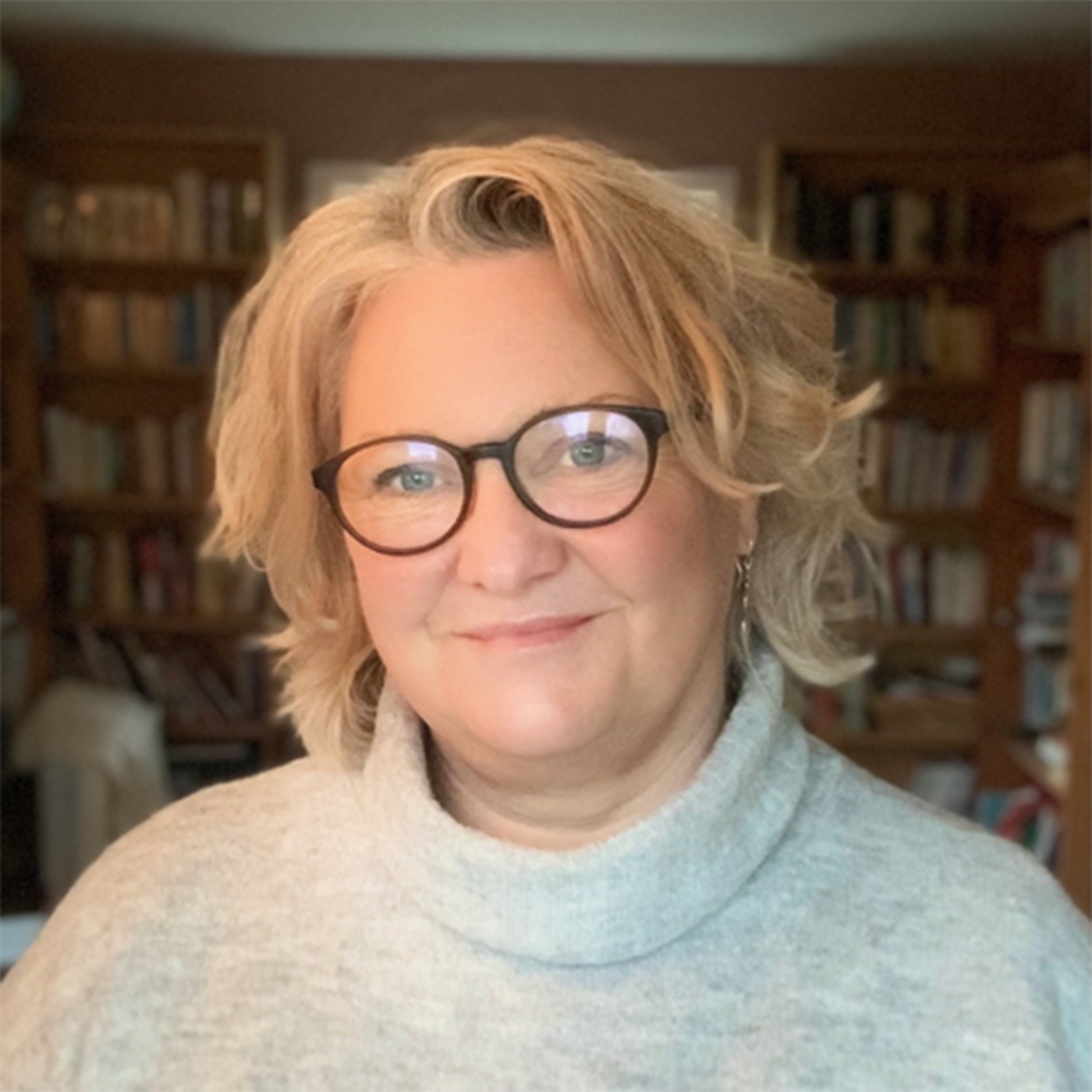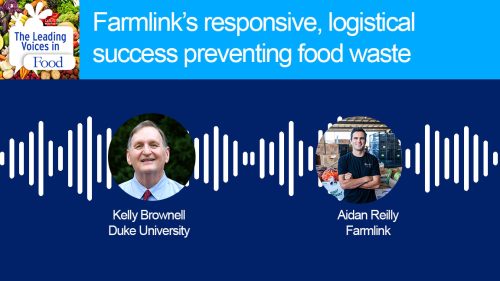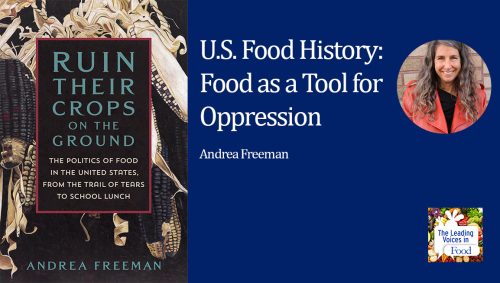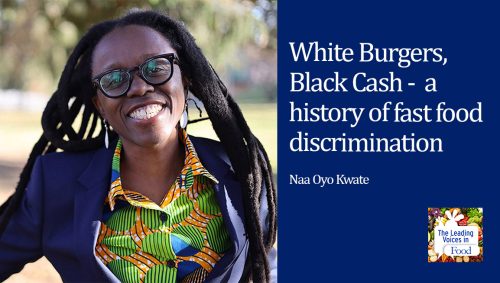The Leading Voices in Food
E264: Citizen engagement in post-Brexit UK food and farming policy
Today we’re exploring civil society’s efforts to shape the food system and land use in the United Kingdom. Our guest today is Sue Pritchard, Chief Executive of the Food, Farming, and Countryside Commission (FFCC). The deeply grassroots work of the commission brings people together to find practical solutions to climate, nature, and health challenges. The goal is to shape fairer and more sustainable food systems and a just transition for rural communities and the countryside.
Subscribe: Apple Podcasts | TuneIN | YouTube Music | SoundCloud | PocketCasts | Radio Public
Tags: Advocacy & Food | Agriculture & Tech | Climate Change, Environment & Food | Community & Economic Development | Food System Narratives |

Sue Pritchard is the Chief Executive of the Food, Farming and Countryside Commission in the United Kingdom. Sue leads the organization in its mission to bring people together to act on the climate, nature and health crises, through fairer and more sustainable food systems, and a just transition for rural communities and the countryside. Sue’s background is in combined research and practice in leadership and organization development for systems change, working with leaders across public, private and not for profit organizations, especially on complex partnership projects. She is a Trustee of UK’s CoFarm Foundation and is an independent Governor at Royal Agricultural University. She lives on an organic farm in Wales where she and her family raise livestock and farm for conservation.
Interview Summary
Well, Sue, I am really interested to start off learning a little bit more about you. Can you tell us why are you interested in food and farming and the countryside?
So, I’m talking to you from Wales, from my farm in Wales. I live and work on a small, organic, conservation orientated farm that produces native breed cattle and sheep. It’s so authentic. I have a duck in my office with me at the moment. So, if any of your listeners hear any odd sounds, I promise you that’s her, not me. I come from a family in Wales, which either went down the mines or farmed and had small holdings. My father went down the mines, but we always, as a family longed to get back to our deeply felt roots. And it was about 27 years ago that my parents and I, my family, were able to buy our farm here in Wales, which is, I suppose, the culmination of a dream. And although we were not naive about farming, when you’re deeply embedded in the everyday life of the farmer and operating in the farming system (the food and farming system) you learn some different things pretty quickly. And so, for a fair few years, I was working out how to make the farm work economically. But also, how the farm could make a really good contribution to tackling the climate crisis and the nature crisis. How we could sequester more carbon on the farm. How we could build more natural infrastructure on the farm to help nature thrive here again.
You will recall, the UK had its own political, should we call it a little, a minor apocalypse back in 2016, when the UK voted to exit the European Union. And, the implications of that vote were pretty, pretty, extraordinary for farming and for food systems and the environment. As a result, civil society, business organizations got together and were able to get some philanthropic funding to set up a commission (Food, Farming, and Countryside Commission) to shape a different future for food and farming and the countryside outside of the European Union. And when that job was advertised, it was my dream job, bringing together, as it did, the future of farming, the future of food systems, and being able to impact and influence policy at a really, really critical time.
I want to make sure I understand a little bit more about what’s happening. Because of Brexit, that means the UK is no longer part of the common agricultural policy and is now needing to reconstruct its agricultural policy structure. It sounds like the commission was brought in to do some of this work. I would like to understand what in particular challenges are facing the food and agriculture scene in the UK post Brexit.
I think that the first thing that we were able to do in the work of the commission was to start talking about food as a system. That was relatively unusual in the UK. One of our leading thinkers, Professor Tim Lang, used to say that the UK’s food policy was basically leave it to Tesco, which is one of our big supermarkets. It was essentially left to private markets to determine the kind of food that we had on our plates. It was clear that that strategy was not working anymore. And given the really quite startling system changing implications of that particular vote, we were able to take a different perspective on food systems and start thinking about food as a system. We talked about, as it says on the tin, food and farming and the countryside, but we also talked about food and farming’s relationship with climate, with nature, with health and wellbeing, and with equity and justice.
In bringing that more, if you like, systemic view into people’s consciousnesses, we were able to demonstrate really how central food policy is to UK’s economy, health and wellbeing of UK citizens. Perhaps in a way that had not been done with quite the same heft as before. Lots of people have been trying but hadn’t quite landed center stage in policy terms. And we were able to show through our work and then our reports, the relationship between food and farming and diet-related ill health. Farming systems and the climate crisis. Farming systems and biodiversity loss and the nature crisis. And also, starting to reveal the inequities, the inequalities embedded in the food system when we start looking not just within our own borders in the UK, but beyond our borders to how the UK trades with the rest of the world.
Because countryside is one of the major themes, it’s in the title of Food, Farming and Countryside Commission, and I’ve spent a little time in England and the countryside. And I’m from a rural area and the United States, and I’m interested to understand how you all are thinking about the needs or the challenges, or even the opportunities that the countryside faces in the UK.
One of the things that I realized when I started this job back in 2017 was that for many people in London, the countryside is just the gap on the map between the cities. They had very little understanding of the contribution of the rural economy, the importance of the rural economy, particularly the countryside’s importance, criticality, even for tackling the climate crisis, tackling the nature crisis. It’s there where a lot of the problems occur, but also where a lot of the solutions can be found too. And so, talking about the countryside, not as a kind of poor relation to the rest of the economy, but actually central to a version of the future that was able to be more resilient, more adaptive to whatever kind of scenarios might unfold. That felt like a pretty important thing for us to be doing. And when we were conducting our work in those early days, we did all the usual things that a commission might do. We did a literature review, we held workshops, we held all sorts of kind of formal research processes. But we also set out around the country, around the UK on a bicycle. My researchers set out around the UK on a bicycle. Because we wanted to do something pretty iconic to show the richness, the diversity, the variety, the political salience and the economic salience of the countryside to policy discussions in Westminster. I think one of our successes has been to bring those voices into policy decisions. And to give them much more gravity, I think, in policy considerations that often feel very distant in London.
How have they shaped the way you all have done the work at the FFCC? Are they altering or informing the work in different ways?
Yes. Absolutely. We work with citizens in a number of different ways. So that first moment, the kind of bicycle tour around the UK was if you like, a symbolic moment of connecting with people in their communities. Going out to where people are, letting them tell us in their terms, what mattered to them, what they cared about, what they were concerned about. But in a really kind of barefoot ethnographic way, I think, being able to hear directly from folk. But we also built long term relationships in three, if you like, sentinel parts of the country: in Devon, in Cambridgeshire, and in Cumbria. Different parts of the UK reflecting different kinds of priorities and different pressures in the countryside. Devon is a grassland community, it’s very touristy. Cambridgeshire is one of the bread baskets of the country, but with huge pressures on housing and infrastructure. And Cumbria is the uplands, the high mountainous uplands that people understand as a holiday hotspot. But working in those places in depth over for five years now, we have been able to both test out policy ideas in, in real places, in real time. Our land use framework project is a case in point. In thinking about how we make better decisions about land, we worked with people for whom those decisions are incredibly material. It’s about what happens in their communities, what happens around them. We were able to develop policy contributions based on testing different options, different possibilities with people in places. And of course, we were able then to bring forward their ideas, their thoughts, and their really practical activities to the view of government, to the view of policy makers and to businesses. It was a kind of reciprocal relationship, testing out ideas in communities, but also bringing community ideas into government, into policy makers. You know, demonstrating how people are already doing things, already doing really interesting and radical and progressive things, whether or not government is supporting them or not.
More recently, we’ve embarked on a very, very substantial project. It’s called the Food Conversation and the Food Conversation is a project that was designed to really test out the answer to the question, so what do people really want from food? I wonder if you have the same experience in the United States, Norbert, but certainly in the UK, we hear over and over and over again, particularly from lobbyists, but often from government, that people don’t really care about food. People just want cheap food. They just want convenient food. Nobody wants to be told what to eat. Nobody wants a nanny state. And those kind of toxic narratives, those devices were being used over and over again to limit government’s appetite for policy intervention. And after this happened, again about two years ago, after the government commissioned its own national food strategy and then declined to respond in any meaningful way to it, I rather spat the dummy in in leadership terms and decided we were really going to have to test out this narrative, this way of framing food policy change. So, we set out 18 months ago, on the biggest civil society dialogue that the UK has ever seen. We conducted 12 citizens assemblies around the UK asking people directly, so what do we really want from food? In academic terms, it’s kind of like a meta review, because what we’ve done is show citizens the kind of research that’s been done over the last 10 or more years. The research has been done by experts in the UK and internationally that show the impacts of the food system on climate, on nature, on our health and wellbeing. And we’ve asked them what they think about the recommendations that those research reports have made. All of those recommendations that have been kind of discounted by governments because ‘no one wants the nanny state.’ You have to imagine my air quotes there. And of course, in conducting that conversation, we found really quite quickly that toxic narrative is not true at all. When you reveal to citizens the complexities and the interdependence of the food system with their health, with the state of their high streets, you know, what, what’s being sold to them and how. When you explain how that impacts on farmers and growers, primary producers. When you explain how it impacts on communities all around the world, often very vulnerable communities around the world. When you explain how it impacts on the climate and nature, people are pretty, pretty shocked and pretty horrified.
And most interestingly, when you show people how the food system has become more commodified, more consolidated in fewer and fewer hands. More financialized by a small number of global agribusinesses who are continuing to make eye watering profits, while, for example, in the UK, our own health service is buckling under the strain of diet related ill health, obesity, heart disease and so on they are furious. They say, why don’t we know and why doesn’t anybody else do anything about this? And so that piece of work, well, this phase of it is coming to a conclusion. We’ve got, oh, 500,000 words worth of material generated by citizens contributions. And that culminates in a summit, the Citizens Food Summit in London on the 19th of November when we’ll be sharing citizens perspectives. And indeed, business perspectives too, civil society organization perspectives. Because lots of businesses are lining up alongside citizens saying this needs to be different. We need to change this. And we’re sharing those insights with policymakers. And the intention is to strengthen their arm in taking a proper systems view of food policy in the UK and starting to act as if food policy really matters. Because it does.
This is impressive work. This idea of listening to citizens and sharing with their government officials their views of the food system. In some ways. It’s so basic you would thought this would be going on already. And yet we all know that this doesn’t happen frequently. It’s an exciting enterprise that you all have engaged. I would be interested to see what happens after the November gathering.
Very, very happy to share that with you. The way that we’ve designed it… you’ll be familiar with citizens assemblies. They’re usually national interventions. They bring people together from across the country. They happen over a period of weeks. They report and then, and then they finish. We’ve designed ours somewhat differently. We designed ours in places, so 12 around the country. Brought together citizens in those places, as well as the anchor institutions. Organizations that can actually get on and do stuff without waiting for government or big business to act. And so, we’ve been both listening to citizens, but we’ve also been doing a little bit of movement facilitation, if you like. We’re helping to build food movements, along with our colleagues who are also doing this work in places around the country. And so already we’re seeing citizens taking the opportunity to carry on talking to each other, to set up initiatives in their own community. To connect with the initiatives that already exist that they might not have known about. To talk to local policymakers and local leaders about how they can do things differently. So, it was really important to us to kind of learn from the successes and perhaps some of the failures of previous assemblies and dialogues to say, what needs to happen so that change can happen as a result of this, so that citizens efforts, citizens contributions, very generous contributions of their time and their insight actually make something happen.
You know what, I realize that this sounds very similar to the work of food policy councils here in the US. It’s a similar sort of structure. But I’m interested, it’s something you said earlier on, and I want to draw attention to this issue. I have my own experience that these efforts, lots of different folks come to the table with varying concerns and sometimes conflicting concerns. If you think about the economic gradient where there are people from higher income households and maybe lower income who are experiencing the food system differently. While they share a lot of concerns, there are some big differences. And I’m interested to hear how you all are dealing with that diversity of thought and experience.
Yeah. So, the way we selected our participants was through the sortition process. We sent out 120,000 invitations around the UK. We got a very high level of response rate to that. But from that number, we selected populations that really reflected their communities. And in some communities, we waited for the seldom heard voices. We wanted to make sure that we really pulled in those people who are less likely to be asked or invited or included in these sorts of initiatives. We built that, if you like, reflection of community in each of the assemblies around the country. We invested in quite a bit of context setting at the start. Helping people get to know each other, connect with each other, understand each other a bit, their own experiences and perspectives on the food system. And then getting people on the same page in terms of, you know, the context of food. What we found, and in fact the professional organizations, specialist organizations that have worked with us on this project have been really startled by it. The consistency of perspective across political backgrounds, educational backgrounds, socioeconomic backgrounds, protected characteristics, race, class, gender. The consistency of response to food systems issues is the highest that our professional advisors have ever seen. And, and that’s, that’s been really, really fascinating to me.
I think it is because, and this goes back to the reason why we wanted to do this work in the first place, very often we end up talking about big, abstracted issues. Even climate and nature can feel big and abstracted. And the political economy of food, very abstracted. When you come back to it, we all have a stake in food. We all have skin in that game. If you frame the conversation in the right way, everybody can participate. And like many things in life, actually, we all want the same things. We want a safe, secure, healthy life. We want to be able to live in a safe, secure, healthy environment for ourselves and for our families, our children, our loved ones. And of course, food is the very thing that connects us. You know, food is at the heart of our celebrations. You know, how we choose to be together when we gather in communities. And we do that so often over food. It’s one of the very, very, very few things that connects us and we have a shared experience. So, whether or not you’re poor or rich, you will celebrate with food. Whether you’re poor or rich, you will want to nourish your children in the best way you possibly can. There are so many things that connect us.
Interestingly, and this was a kind of side benefit of this work, in a country which, I think, like yours, can feel incredibly polarized and at risk to populist politics that seeks to divide us over and over again. The conversations around food and food policy and how we might want food to be different in our communities, really united people. And it really showed people as being more thoughtful, more respectful, more insightful, more considered than very often we are led to believe right across the political divides. There’s something very kind of visceral and you know heart centered about food that does help people connect.
Getting quickly then into the technical stuff. How do we make decisions about policies? We said to people here are all the policy ideas. There are hundreds. There are hundreds of policy ideas. We can group them together in categories, health, nature, farming, and so on. And we invited people to categorize them using a really simple taxonomy. Should government’s business just do it? This is obvious, just do this thing. Should they test it? It needs a bit more research. We need to test this out a little bit more, in more detail. Or should we debate it? Is this actually quite complicated, indeed contested? And we need a better process to making some choices around this. People were able to look through those policy choices with some real thought and insight. And there’s remarkable consistency between people about things that we just ought to get on and do. Things like formulating children’s foods in schools. That there ought to be some really clear guidelines about the quality of food that’s available for children in preschool and school. That doesn’t exist at the moment. People don’t understand why on earth that doesn’t happen. For some big issues, like should we introduce universal basic income for farmers to make sure they have a level of income that doesn’t make them vulnerable to, you know, price gouging by companies? People said, oh, that’s quite complicated. We’d have to work out what that would look like, what impacts that would have on the rest of society. But it’s an idea worth exploring further. So they explored everything from really, really basic stuff through to big economic issues that could be really quite transformative in a country like ours.











